Dentures – Los Angeles, CA
Take Severe Tooth Loss Head-On
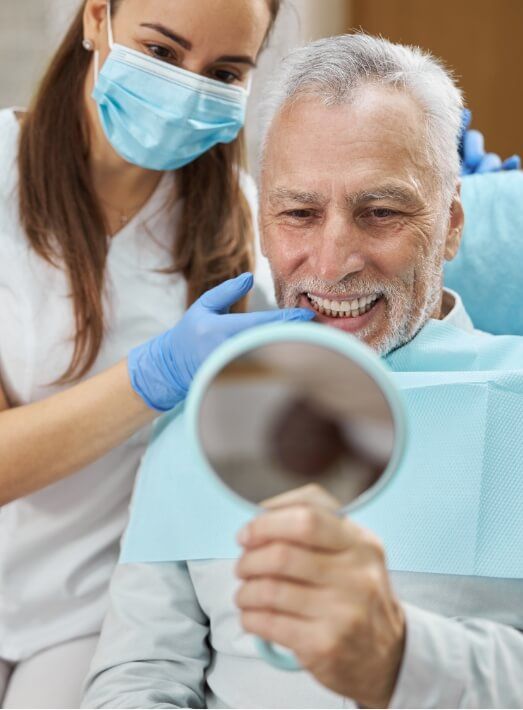
Full dentures replace all missing teeth on the upper or lower arch, and partial dentures replace multiple missing teeth on one arch. Dr. Latner often designs esthetic, custom-fitted dentures in Los Angeles to help patients reclaim their quality of life through total oral function and beauty.
Full dentures are secured with adhesive or natural suction, while partials rely on clasps connected to adjacent teeth for stability. In some cases, particularly with lower dentures, slippage or looseness becomes a problem. Dr. Latner may recommend mini-dental implants or traditional dental implants to hold a denture securely in place.
Why Choose Westside Dental Associates for Dentures?
- High-Quality Materials Used for Natural-Looking Prosthetics
- Innovative Dental Technologies
- 30+ Years Serving the Los Angeles Community
Who’s a Good Candidate for Dentures?
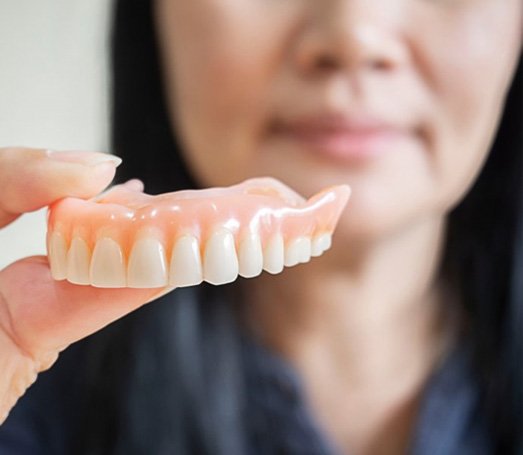
If you’re missing one or all of your pearly whites, you’ll likely be eligible for dentures. Of course, our team will need to first evaluate your situation to determine how best to renew your functional bite while providing equally dazzling results. Even if you aren’t a good candidate right away, we can still help you get back on track with oral health to ensure a successful treatment. Once we’ve prepared you for the treatment, we can discuss your options for renewing your smile.
Read More Read Less
Effects of Missing Teeth
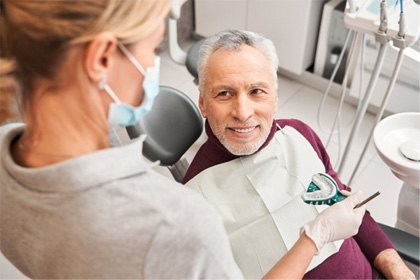
There are a wide variety of reasons why a person can end up losing their teeth. Some of the most common causes involve advanced periodontal disease, extreme tooth decay, accidental physical injury, and even poor oral hygiene. While you may not experience much discomfort after losing a tooth, missing one or more can lead to other complications, such as facial sagging, jawbone deterioration, and difficulty speaking and eating. Not only can this affect your oral health, but it can significantly impact your quality of life. Fortunately, dentures provide an effective method for renewing your smile.
What Qualifies You for Dentures?

Nearly anyone who’s suffering from tooth loss can be qualified for dentures. Still, you need to meet certain requirements before moving forward with this treatment, such as healthy gums and a dense jawbone. You’ll also have to be committed to practicing strict oral hygiene to maintain your dentures and the rest of your smile.
The kind of dentures that you’ll receive will also depend on your specific case, as some patients are missing an entire arch of teeth while others only need to replace a single tooth. Your options will typically include partial dentures, full dentures, and implant dentures. Furthermore, dentures offer a highly affordable solution for those working with a budget, that way you don’t have to worry about breaking the bank while getting your full smile back.
Alternative Tooth-Replacement Options

If traditional dentures aren’t viable for you, our team can still discuss alternative options that are highly effective for rebuilding missing pearly whites. Here’s what you can expect from each solution:
- Dental Bridges – A dental bridge is perfect for patients who are missing 2-3 teeth in a row. This solution utilizes two dental crowns connected by pontics to effectively “bridge” the gap in your smile.
- Dental Implants – Instead of relying on adjacent healthy teeth or your gum line, dental implants are supported via the jawbone. This treatment offers an incredibly stable and lifelike foundation for your restorations, and you can expect the results to last several decades to a lifetime if you practice proper care.
Implant Dentures

When appropriate, Dr. Latner suggests traditional dental implants for denture retention. Various styles of implant dentures are available, such as the four-post or the bar-clip solution. Dr. Latner will review your options and help you determine which is best for your unique case.
Mini Dental Implants

If sufficient bone tissue is present, Dr. Latner can insert small posts into the sockets left by a few missing teeth. These posts are called mini dental implants, and they secure a denture, which snaps into place. Mini implants do not require true dental surgery. They are designed to be inserted in Dr. Latner's office during a simple and quick procedure. Your bone tissue will fuse to the mini dental implants to form a solid foundation for your denture or partial.
Our patients love implant dentures because they eliminate the need for special cleaning routines, and they can last a lifetime. If you choose implant dentures or partials, you will not need adhesives, suction, or clasps.
Benefits of Dentures

- Varied Diet: There are plenty of foods that you simply wouldn’t be able to eat without teeth, but fortunately dentures will let you continue to enjoy many of them.
- Improved Speech: The support of false teeth can help you speak more clearly.
- Enhanced Appearance: Obviously, a full set of teeth makes for a much better smile that you can be proud to show off. Also, full dentures can give your facial muscles the support they might lack after tooth loss.
- Custom-Made: To make sure they’re as comfortable and functional as possible, each set of dentures is uniquely designed to fit in your mouth.
- Removable: Traditional full and partial dentures can be taken out of the mouth for thorough cleanings.
- Long-Lasting: Dentures can typically last for about ten years, and they can be adjusted and repaired during this time to extend their lifespan as much as possible.
Partial Dentures

Did you know that there are dentures that can be used to only replace specific teeth? Partial dentures are designed to be used by patients with plenty of healthy teeth that nevertheless need to fill in the gaps in certain sections of their mouths. Like full dentures, partial dentures consist of false teeth and a base that sits directly on the gums; however, they’re supported and held in place by metal clasps that have been attached to healthy dental structures. They can sometimes be retained by implants, although this assumes that there’s currently plenty of bone tissue in your jawbone.
Full Dentures

If you imagine a complete arch of artificial teeth whenever you hear the word “dentures,” you are specifically thinking about full dentures. The base of full dentures is colored so that it resembles gum tissue, and the teeth are typically made out of porcelain or another material that closely resembles natural tooth enamel. When the base is placed on the gums, it forms a natural seal that holds it in place, providing enough stability for you to chew and speak. If for any reason, your dentures begin to slip, you can use a special kind of adhesive to help stabilize them. (Of course, this won’t be an issue at all if you receive dental implants.)
Understanding the Cost of Dentures

How much will you end up paying for dentures? This is naturally a very important question, but unfortunately, there’s no one correct answer. Full dentures are likely to have a different price than partial dentures; for the latter, the exact cost can vary quite a bit depending on your specific tooth loss. During your consultation, we will go over the estimated cost of your treatment in detail so that you don’t run into any surprises. Until then, here are some things to take into consideration.
Read More Read Less
Factors That Affect the Cost of Dentures
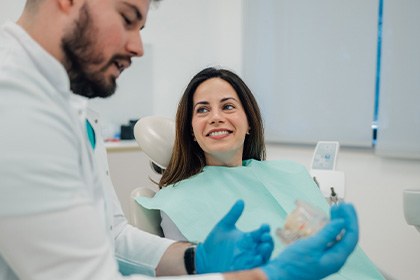
There are several factors that contribute to the cost of dentures. Here are some of the most important ones.
- Preparation: If you require preliminary procedures, like gum disease treatment or tooth extractions, you should consider those costs as well.
- Material: Dentures can be crafted from multiple materials. They are all set at different price points.
- Type of Denture: In most cases, the bigger the prosthetic, the higher the cost. Implant dentures are priced higher because they require a surgical procedure.
Are Implant Dentures More Expensive?

Implant dentures have a higher cost than traditional dentures, and there is a good reason for this. Instead of being supported by the shape and suction of the mouth, implant dentures are supported by several strategically placed dental implants throughout the jawbone. This allows for additional stability, comfort, and longevity. The achieve this, getting dental implants requires a surgical procedure and many months of healing, making this cost higher. Implant dentures are made to last for multiple decades or even the rest of your life.
Does Dental Insurance Cover Dentures?

Most dental insurance providers consider dentures to be a major restorative procedure. This means that they are often covered up to 50% after your deductible has been met and before you have exceeded your maximum. However, every plan is a little bit different, so it is best to reach out to your provider directly so that you don’t run into any surprises.
Other Options for Making Dentures Affordable

If you don’t have dental insurance, this doesn’t mean that you are completely out of luck. We are happy to accept payments through CareCredit – a third-party financing company that can split the cost of your treatment into manageable monthly installments with little to no interest. If you have any questions or need help applying, don’t hesitate to reach out!
Dentures Aftercare
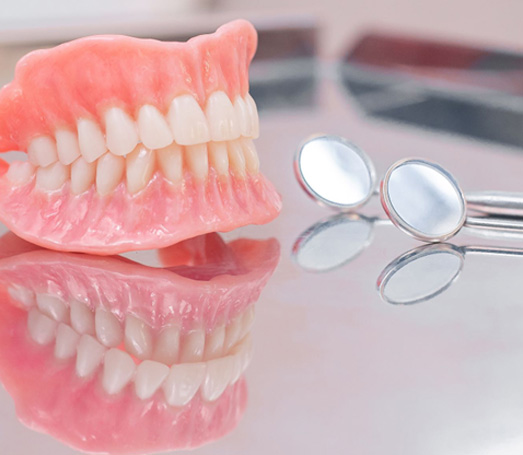
Dentures are a versatile solution that can help transform your smile’s appearance and functionality for years to come. However, that’s only if you continue to maintain your dental health.
Even those who have no natural teeth remaining might develop oral concerns, such as gum disease. You can prevent this by scheduling a routine checkup and cleaning with our team every six months, and by making efforts to maintain your restoration. Continue reading to learn more about maintaining your dentures!
Read More Read Less
Removable Dentures

Remove After Eating
Wearing your new teeth can strengthen your bite force, which allows you to enjoy a wider variety of wholesome foods to support your oral and overall health. However, bits of food, bacteria, and other debris can cling to their surface and form plaque, which contributes to periodontal problems and other concerns.
Taking your teeth out to rinse them under gently running water helps prevent this residue buildup to protect your smile. Please remember to use cool or lukewarm water because overly hot temperatures can warp the acrylic base so it no longer fits.
Clean Your Restoration
You should also remove your dentures twice daily to brush all their surfaces thoroughly with a soft-bristle toothbrush and mild dish soap or special paste that won’t abrade the material.
Then, rinse them off before reinserting them to continue your day. If it’s evening and you’re heading to bed, soaking is recommended to help kill germs and maintain their shape overnight.
Keep Your Dentures Safe
Your new teeth can become quite slippery during cleanings, and can unfortunately be chipped, cracked, or broken if they fall onto a hard enough surface or from a tall enough height.
Placing a small cushion or towel beneath you to brush them can prevent potential injuries. Also, if you’re not wearing your dentures, please be sure to store them out of the reach of small children or pets who might not handle them carefully.
Remove Dentures When You Sleep
Although falling asleep with your dentures inserted one or two times might not be overly harmful, it’s generally not recommended to keep them in your mouth overnight. This is because they rely on a firm bond with your gums to remain in place, which reduces circulation to your connective tissues.
This reduces your body’s ability to deliver essential nutrients and infection-fighting cells, which increases the likelihood of developing gum disease or other concerns. To avoid this, you can place your restoration in a glass of room-temperature water or a special soaking solution while you rest.
Notice Changes
Paying attention to your own dental condition helps you notice when concerning changes occur, so you can schedule an appointment with Dr. Latner before they can progress.
For instance, if you see chips, cracks, or other damage to your dentures, please contact our office for an appointment rather than try to fix them yourself, because you might accidentally harm them further.
Also, if you hear clicking noises, your teeth feel loose, or you’ve developed blisters or sores, please let us know so we can ensure your dentures still fit correctly.
All-on-4 Dentures

All-on-4 dentures are anchored to dental implants in your mouth and aren’t intended to be removed and reinserted regularly. To keep them clean, brush them in your mouth with a soft-bristle toothbrush and a non-abrasive toothpaste.
Then, to remove plaque and bacteria that may have accumulated between the restoration and your gums, you can floss gently with a floss threader or an oral irrigator (water flosser).
Dentures FAQs
Do you have questions about what life will be like with dentures in Los Angeles? The best way to find out is to schedule a consultation, but we’ve also answered some common questions that we receive from our patients below.
Can I sleep with my dentures in?
It’s not recommended that you sleep with your dentures in your mouth, because it could cause them to dry out and alter their fit. Each night, it’s important to soak your dentures in room temperature water or a denture-soaking solution to allow them to hold their shape and to give your gums a rest.
How often do I need to clean my dentures?
It’s important to clean your dentures every day and soak them each night while you’re sleeping. Here are some maintenance tips to make sure your dentures continue looking like new and stay clean:
- Remove your dentures and rinse them after each time you eat.
- Clean your mouth with a soft-bristled toothbrush after removing your dentures.
- Brush your dentures using a special denture brush and denture cleaning solution. Using a regular toothbrush and toothpaste could scratch or damage them.
- Schedule regular checkups and cleanings.
If you would like any additional advice or have questions about cleaning your dentures, feel free to contact our office.
My dentures feel loose, what should I do?
If you’ve had your dentures in Los Angeles for a while, and they begin to feel loose or fit differently, that could be a sign that the shape of your mouth and jaw are changing. This could be a sign that your dentures need to be readjusted or relined so they continue to function properly and fit in your mouth comfortably.
How much denture adhesive should I be using?
Before putting denture adhesive onto your restorations, make sure that they are clean and completely dry. It’s always better to place a smaller rather than a larger amount because too much can become messy and will require you to start the process over. Place a series of small dots along your dentures, being sure not to apply the adhesive too close to the edge. When fitting them to your mouth, firmly press them and hold them in place. One application of adhesive a day is usually enough.
How often do dentures need to be replaced?
Dentures typically last between five and 10 years, depending on how well they’re maintained. If they become broken or fractured, be sure to immediately visit your denture dentist in Los Angeles to have them inspected and repaired. Otherwise, you should be able to enjoy them for years to come.
Can I use regular toothpaste to clean my dentures?
Unfortunately, no, you instead must use a non-abrasive toothpaste. Regular products can scratch and damage your dentures, whereas non-abrasive solutions will ensure the coating and materials that make up your prosthetics remain healthy and natural in appearance. But even when using the right toothpaste, you should remember not to brush aggressively. Instead, allow a soft-bristled toothbrush, a light hand, and a denture cleanser to eliminate bad oral bacteria.
Will dentures change the shape of my face?
Tooth loss can result in what is referred to as facial collapse or sagging. This is when there is a lack of jawbone density that helps to support your facial muscles. As a result, the jowls begin to hang, the nose droops downward, and the cheeks appear sunken. Not to mention, the lips begin to turn inward. With dentures, however, they can help to fill in these areas of your face, giving you a more youthful appearance.
Is it hard to talk with dentures?
Initially, you may find it difficult to talk normally while wearing dentures but with much practice, you’ll notice any speech impediment that you develop will quickly dissipate. A slight lisp is normal and learning to speak while keeping your prosthetic in place takes practice. However, if you practice certain words and syllables that are more difficult (i.e., “s” or “z”), read aloud to yourself, and watch yourself in the mirror when pronouncing challenging words, you’ll soon begin speaking with greater ease.

